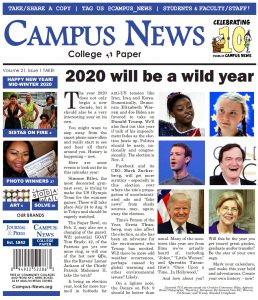By Jonathan Custodio
Campus News
An initial survey on how millennials view college education was distributed last November, but the collected data is so expansive that it requires an additional report.
“We’ve not really analyzed everything, inside out, the way it could be analyzed,” says Dr. Larry Chiagouris, who directs the research and is a consumer marketing, higher education and employment expert. He and his team are looking deeper into the key areas that affect career satisfaction post-graduation, including graduates’ majors and how their perspectives on tuition-free college and student debt forgiveness correlate with or influence their feelings of preparedness regarding their careers.
According to the first report, which survey over one thousand graduates, a large percentage of millennials want to have free college and their debt forgiven. It also revealed that 40% of them felt they did not incorporate enough preparation for their careers in their college experience.
“We already learned that millennials are more satisfied with their lives than they are with their careers,” says Chiagouris, noting an underwhelming majority that could signify a generation with expectations that supersede reality or a reality that is simply dissatisfying. “More than a third are not satisfied.”
Employers have told the author of “The Secret to Getting a Job After College” that they are trying to work with millennials in these areas of satisfaction but one employer told him during his round of interviews that “the reason why they call it work is because it’s work.”
Dr. Chiagouris has been a professor for 25 years and part of his expertise in consumer marketing has included following research that deals with happiness for the last couple of decades. “Consumer marketers need to understand what makes consumers happy.”

“In terms of happiness, people find this surprising [but] it’s really not about money. Yeah, people need to make enough money to have a decent life,” says Chiagouris, noting that once people meet their threshold of job security, they begin looking to fill specific voids of happiness and satisfaction. “The most recent research shows, and not my research [but] research by others, shows that once you’re making 80 or $90,000 a year, the difference between $80,000 a year and $120,000 a year doesn’t necessarily translate to great amounts of happiness and levels of satisfaction.”
Those amounts of happiness and levels of satisfaction tend to center on quality of life issues like flexibility of hours, good management, and getting along with coworkers, also highlighting the extreme importance of the social aspect and interactions of a workplace.
“If someone has a great job, great boss [and] great coworkers, they can tolerate less money,” explains Dr. Chiagouris.
Roma Choudury, 26, feels her experience at Lehman College has not prepared her much for life but that she has taken away ideas that will aid her intended career in health care administration.
“Career-wise, it’s going to help me a lot. Learning about healthcare. Learning about administration,” she says, spotlighting her strategic management class. “My professor taught me about personal development. He said you can’t just professionally develop; you have to personally develop.”
Not all professors have that kind of impact.
“I still hear the voice of the radio journalism professor echoing: ‘I don’t think daily news is your cup of tea, dear,’ which motivated me to get back to school, a decade later, maybe, and pursue journalism,” explains Ambar Castillo, a 2010 graduate from Boston University, who just finished her first semester at the Craig Newmark Graduate School of Journalism at CUNY. “I got to explore a lot of my different interests with writing. I also had a magazine journalism professor tell me that I could not write things specifically for a Latina audience because Latinas are not different from white men.”
Dr. Chiagouris is also planning to interview people who have not finished or gone to college and compare them with college graduates to identify any differences in life satisfaction, which is a survey that he and his team plan to conduct after analyzing the remaining data of the initial research.







Facebook Comments